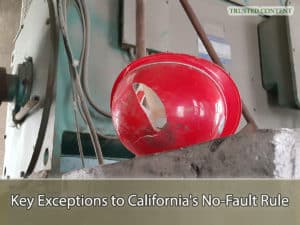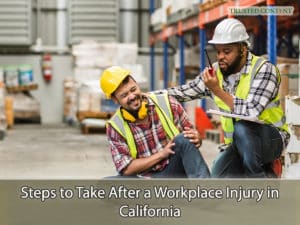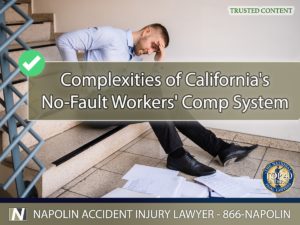Navigating the Complexities of California’s No-Fault Workers’ Compensation System
In California, the workers' compensation insurance system is designed to support employees who suffer work-related injuries or illnesses. This no-fault system ensures that workers receive medical treatment and compensation without the need to prove their employer's negligence. However, the system's complexities and exceptions can be daunting for many. Understanding these nuances is crucial for injured workers seeking the benefits they rightfully deserve.
Understanding No-Fault Workers' Compensation
The cornerstone of California's workers' compensation system is its no-fault nature. This means that employees are entitled to receive benefits for work-related injuries regardless of who was at fault. The primary aim is to provide quick and efficient relief to injured workers, covering medical expenses, lost wages, and rehabilitation costs. This system benefits employers by limiting their liability and protecting them from personal injury lawsuits by employees. However, while the no-fault system simplifies the process of claiming compensation, there are specific exceptions that both employees and employers must be aware of.

Key Exceptions to California's No-Fault Rule
Key Exceptions to California's No-Fault Rule
Mutual Combat: Understanding the Initial Aggressor Rule
One of the less commonly known exceptions to the no-fault rule involves incidents of mutual combat. If an employee is injured during a physical altercation in which they were the initial aggressor or willingly engaged, they may be disqualified from receiving workers' compensation benefits. The rationale behind this exception is that engaging in a fight is a personal choice that falls outside the scope of employment. Employers must prove the employee's role as the aggressor to deny benefits, which can involve gathering witness statements and other forms of evidence.
Intoxication and Workplace Injuries
Intoxication at the time of injury is another significant exception to the no-fault rule. If an employee's intoxication is found to be the primary cause of the workplace accident, their claim for workers' compensation benefits may be denied. This exception underscores the importance of maintaining a safe and sober work environment. Employers must demonstrate a clear causal link between the employee's intoxication and the incident, often relying on drug and alcohol testing, alongside witness testimonies.
Horseplay and Self-Harm: Impact on Claims
Engaging in horseplay or committing intentional self-harm that leads to an injury can also exclude employees from receiving workers' compensation benefits. This exception is based on the principle that such actions significantly deviate from employment duties and responsibilities. For a claim to be denied on these grounds, it must be established that the employee's conduct directly contributed to their injury. This determination often involves a detailed investigation into the circumstances surrounding the incident.

Steps to Take After a Workplace Injury in California
Steps to Take After a Workplace Injury in California
Immediate action following a workplace injury is crucial for protecting your rights. Report the injury to your employer as soon as possible, seek medical attention, and document everything related to your injury and treatment. Filing a workers' compensation claim promptly is essential to avoid delays in receiving benefits. Understanding the claims process and your rights under California law can significantly impact the outcome of your case.
The Importance of Legal Representation in California Workers' Comp Claims
Navigating the complexities of workers' compensation claims, especially when exceptions are involved, can be challenging. An experienced workers' compensation lawyer can provide invaluable assistance, from evaluating the merits of a claim to representing the injured worker in disputes. Legal expertise is particularly crucial in cases where exceptions to the no-fault rule might apply, ensuring that employees' rights are vigorously defended.

Navigating the Complexities of California's No-Fault Workers' Compensation System
Navigating the Complexities of California's No-Fault Workers' Compensation System
At Napolin Accident Injury Lawyer, we understand the challenges injured workers face in California. Our firm is committed to providing comprehensive legal support to ensure that your rights are protected and that you receive the compensation you deserve. With extensive experience in workers' compensation law, we are prepared to navigate the complexities of your case, from initial claim filing to litigation, if necessary.
Understanding California's no-fault workers' compensation system and its exceptions is essential for any employee working in the state. If you or a loved one has been injured at work, it's important to seek knowledgeable legal representation to guide you through the process and advocate on your behalf. Contact Napolin Accident Injury Lawyer at (866)-NAPOLIN for a free consultation. Our expertise in workers' compensation law ensures that you have the support you need to secure the benefits you deserve.
- Safely and Legally Navigating Parking Lots in California - July 15, 2024
- Navigating the Aftermath of a Highway Auto Accident in California - July 15, 2024
- An Overview of California's Commercial Truck Insurance Laws - July 15, 2024
